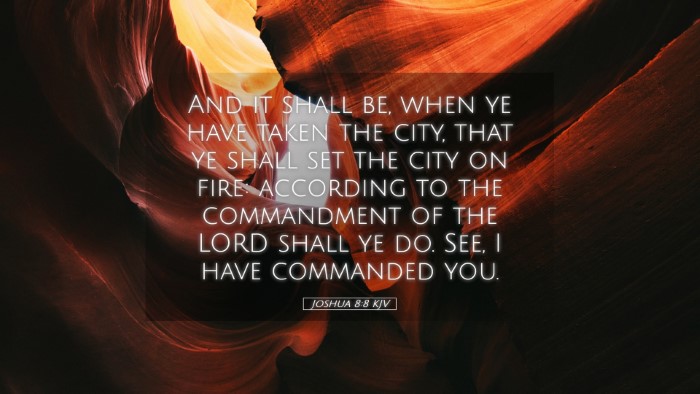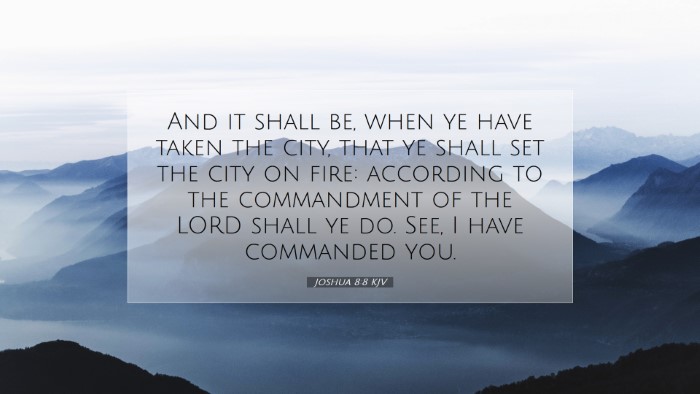Bible Commentary on Joshua 8:8
Joshua 8:8 serves as a crucial moment in the narrative of the Israelite conquest of Canaan, illustrating the strategic and spiritual dimensions of warfare. Combining insights from various public domain commentaries, this analysis delves into the multifaceted implications of this verse, particularly focusing on the command given to the Israelites regarding the city of Ai.
Text of Joshua 8:8
"And it shall be, when ye have taken the city, that ye shall set the city on fire: according to the commandment of the Lord shall ye do. See, I have commanded you."
Contextual Background
The context of Joshua 8 involves the Israelites experiencing initial defeat at Ai due to disobedience (see Joshua 7), which underscores the importance of unity and obedience to God's commands. This verse marks a pivotal turnaround as God reassures Joshua and provides a strategic plan for the capture of Ai.
Commentary Insights
Divine Command and Obedience
Matthew Henry remarks that God is demonstrating His authority through the command given to Joshua. The directive to “set the city on fire” signifies total destruction, a common practice in ancient warfare as a sign of victory yet also a reflection of divinely ordained judgment against the city's wickedness.
Albert Barnes expounds on the obedience required from the Israelites: the Israelites are not to act out of mere military strategy but must recognize that their victory hinges on adherence to God's command. This theme of obedience resonates throughout the entire biblical narrative.
Symbolism of Fire
Fire serves as a potent symbol in scripture, often representing judgment and purification. Adam Clarke emphasizes that the act of burning Ai signifies not only destruction but also the removal of its corrupt influences from the land. Thus, the fire symbolizes God's righteous judgment against sin, which is a pervasive theme throughout the Old Testament.
Strategic Warfare and Divine Guidance
Henry notes that the military strategy emphasized in this passage illustrates the importance of seeking divine guidance in our plans. Joshua’s success is directly tied to his dependence on God's instructions, showing that spiritual warfare is guided by divine wisdom rather than human understanding.
Clarke adds that the detailed plan given by God underscores the necessity for believers to actively seek God's counsel in all endeavors, especially those that deal with significant challenges. The meticulous nature of the instructions illustrates the seriousness of God’s desire for obedience in implementing divine plans.
Lessons for the Community of Faith
This narrative offers rich lessons for contemporary believers, emphasizing the importance of unity and collective obedience. The triumph over Ai stands as an example that when the people of God align their actions with His commands, they can experience victory even in the face of prior defeat.
- Unity in Pursuing God's Will: The Israelites act as a single unit under Joshua's leadership, demonstrating collective commitment to God's directions.
- Importance of Integrity: The destruction of Ai serves as a reminder of God's judgment upon unholy practices and worldly influences.
- The Necessity of Divine Strategy: The specific instructions highlight the need for seeking God's strategy in achieving the mission that He has set before us.
Theological Reflections
The interpretation of Joshua 8:8 extends beyond mere historical recounting to convey theological truths that continue to resonate. Henry posits that the text reflects God's sovereignty and the serious nature of sin, prompting readers to reflect on personal and communal sinfulness.
Barnes concludes that understanding God's holiness and righteousness is critical for approaching biblical narratives. The destruction commanded reveals God's intolerance for sin, urging a response of repentance and fidelity from His people.
Application for Modern Believers
Joshua 8:8 challenges modern believers to evaluate their own lives in light of obedience and divine strategy. Just as Joshua and the Israelites were called to act decisively under God's command, Christians today are urged to pursue holy living, to seek God's guidance in all matters, and to uphold the unity of the faith community.
Conclusion
This examination of Joshua 8:8, informed by the insights of Matthew Henry, Albert Barnes, and Adam Clarke, reveals the theological depth and practical instruction arising from this verse. It culminates in an understanding that faithfulness to God's command leads to both spiritual and community renewal. The invitation to seek God’s direction in our lives remains ever relevant, encouraging us to act rightly in our personal endeavors and collective missions as a church.


